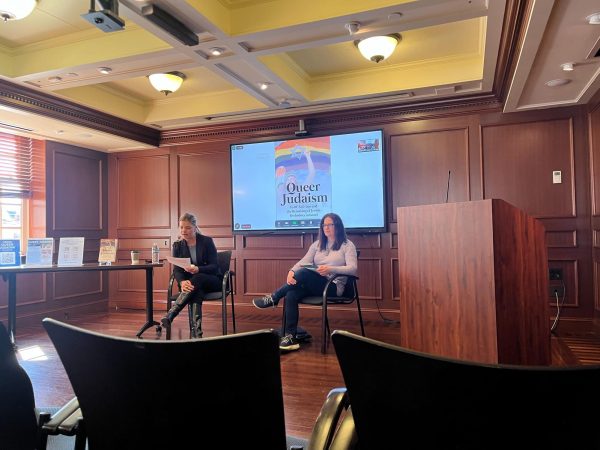The author of a book examining the evolving relationship between the queer community and Orthodox Judaism shared insight about her ethnographic research and writing process at a Feb. 20 event.
Orit Avishai, a professor of sociology and women’s, gender and sexuality studies at Fordham University, discussed her March 2023 book “Queer Judaism: LGBT Activism and the Remaking of Jewish Orthodoxy in Israel” and her experiences with ethnographic research. The Center for Jewish Civilization (CJC), an interdisciplinary unit within the School of Foreign Service (SFS) that focuses on analyzing Judaism as both a religion and civilization, hosted the event.
Avishai’s book explores the increasing visibility of the queer community within Orthodox Judaism in Israel and how this phenomenon has contributed to the rise of a productive activist movement. The book largely centers on recounting stories from openly queer people.

Avishai said that a common theme she heard during her interviews was a desire to create space for queer people to exist and express their identities.
“There was a rhetoric of political moderation: ‘We’re not here to rock the boat, we’re not here to make some huge statement, we’re not here to blow up the system, we just want,’ as one activist said, ‘A room of our own in the Jewish home,’” Avishai said at the event.
Jessica Roda, an assistant professor of Jewish civilization at Georgetown who researches the Orthodox Jewish community and moderated the event, said that discussions of queerness in religious communities, like those Avishai’s book explores, are relevant globally, not just in Israel.
“Some people may resist or refuse this type of dialogue,” Roda said in her introduction. “In this context, engaging in dialogues that transcend the immediate conflict might be perceived as legitimizing or accepting violence. Instead, I see it as an opportunity to unsettle our complacency and challenge our perspectives.”
Avishai said that her position as an ethnographer, a community-based researcher whose work synthesizes qualitative and quantitative approaches, shaped how she researched her book, which was conducted before the Oct. 7 attacks in southern Israel and the ensuing invasion of the Gaza Strip.
Avishai said she aimed to be transparent in her research that she is someone who does not identify with the queer Orthodox community she was researching — especially to her interviewees.
“I was very upfront. I was born and raised in Israel, so a native Hebrew speaker, but as far from orthodoxy as you could be, and I do not identify as queer,” Avishai said. “People did not care, and for many, especially the activists, they thought it was actually an advantage to have a professor coming from the US to write about their movement.”
Roda said that she hoped the event would cause people to reassess their preexisting opinions on the relationship between queerness and religion.
“It’s very hard to have a dialogue like this because there are radical positions on so many different sides,” Roda said in an interview with The Hoya. “Work like this puts us in uncomfortable positions on so many different issues. So that’s the idea, to be uncomfortable, to be confused and maybe to rethink a lot of assumptions that people will have on different issues related to sexuality.”
Avishai said that, in compiling her research, she had to both theorize and tell stories because she has noticed through her experience as a professor that queer and sexuality theory classes often lack a study of religion.
“There’s this sort of ‘problem of religion,’ right? I came to the field with an interest in ‘What does it mean to be queer? How do you make change?” Avishai said. “The fact that this was an LGBTQ movement for social change didn’t quite follow the script for other secular movements.”
Avishai said that the queer community in Israel is an important topic because it presents two groups that people tend to see as opposed. She said ethnography can be particularly powerful because it is rooted in the stories of individual people.
“This is really the power of ethnography, right?” Avishai said. “When you start from the ground up, then you’re constantly grounded in the stories people tell. Yes, obviously there’s framing and there’s an interpretation and a critical view and it is our responsibility to note those.”
“But the research comes together around the stories that people themselves tell, and people are complicated, right? Lives are complicated,” Avishai added. “People blow up binaries and categories all the time.”








